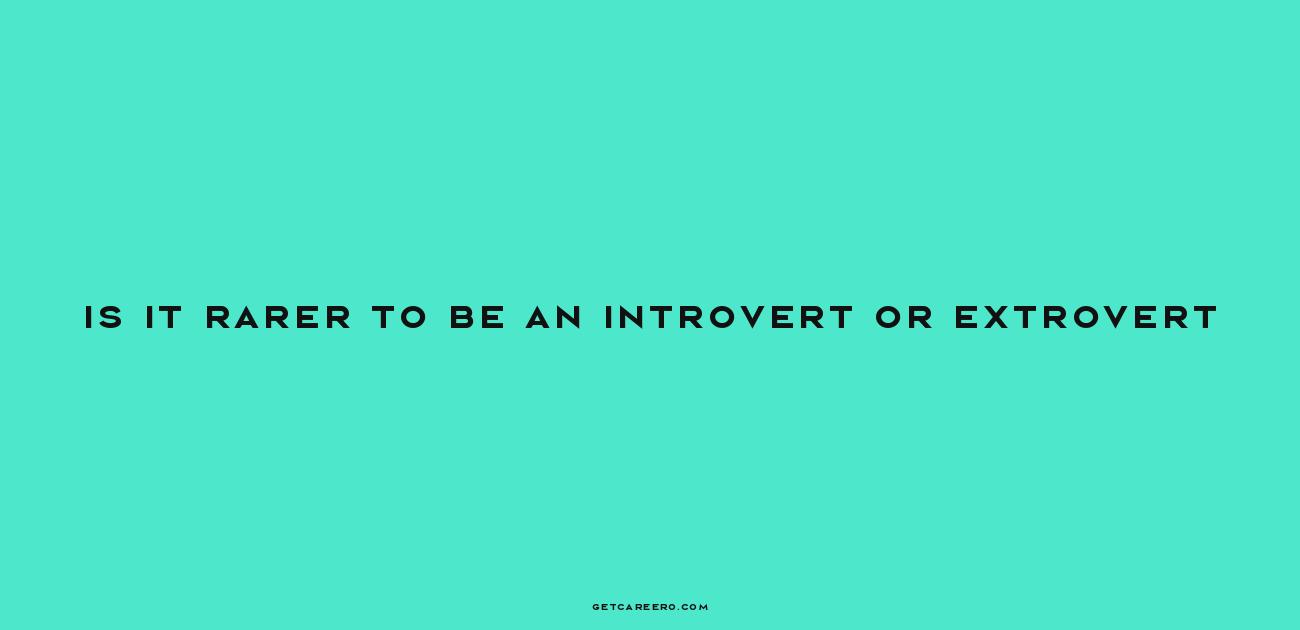Is Being an Introvert or Extrovert Rarer? Unveiling the Truth and Debunking Myths – Are you an introvert or an extrovert? It’s a question we’ve all been asked before, and it’s one that sparks curiosity and debate. But have you ever wondered which personality type is rarer? Is it the outgoing extroverts who thrive in social settings, or the introspective introverts who find solace in solitude? In this blog post, we’ll delve into the prevalence of extroversion and introversion, exploring the surprising correlations, misconceptions, and the different subtypes within each personality spectrum. So, whether you’re a social butterfly or a quiet observer, join us on this journey of self-discovery as we embrace the beautiful diversity of personalities.
The Prevalence of Extroversion and Introversion
The question of whether it is rarer to be an introvert or extrovert is frequently pondered within the context of social dynamics and personality studies. Psychology has long been fascinated with categorizing humans based on their tendencies toward extroversion or introversion. According to research, the scale seems to tip in favor of extroverts, who reportedly make up a significant majority. Specifically, extroverts are estimated to constitute 50 – 74 percent of the population. This range indicates that for every introvert, there are potentially up to three extroverts.
Understanding the Intelligence Equilibrium
Delving into the cognitive capacities of introverts versus extroverts, studies have consistently found an equilibrium in terms of intelligence. The brainpower between those who are energized by social interactions and those who find solace in solitude is, on average, equivalent. This debunks any myths of intellectual superiority inherent to either personality type and underscores the fact that intelligence does not favor one over the other.
Giftedness and Introversion: A Surprising Correlation
While introverts may be outnumbered, they do hold a remarkable distinction in one area: giftedness. It’s been found that around 70% of individuals classified as gifted exhibit introverted tendencies. This suggests that while introverts are fewer in number, they are disproportionately represented in the gifted population, highlighting a unique relationship between introversion and high cognitive abilities.
Carl Jung’s Perspective on Personality Types
Carl Jung, the pioneering psychiatrist, posited that there is no such thing as a pure introvert or extrovert. Each person exhibits a mixture of both tendencies, with one generally being more dominant than the other. This continuum of introversion and extroversion means that categorizing someone as entirely one or the other is an oversimplification of the complex nature of human personalities.
The Four Subtypes of Introverts
Introversion, despite being less common, is far from a monolithic trait. There are multiple facets to introversion, resulting in four recognized subtypes. These are:
- Social Introverts: Those who prefer small groups or solitude, not out of shyness, but out of preference.
- Thinking Introverts: Individuals who are introspective, thoughtful, and self-reflective, often getting lost in their thoughts.
- Anxious Introverts: Those who may avoid social situations due to feelings of awkwardness or shyness, often ruminating on what could go wrong.
- Restrained/Inhibited Introverts: Individuals who take time to take action or think before they speak, often appearing reserved.
Exploring the Rarity and Misconceptions of Introversion
Despite the fact that introverts are less common, the rarity of introversion is often entangled with misconceptions. The minority status of introverts can sometimes lead to misunderstandings or stereotypes, such as the notion that introverts are shy or antisocial. However, introversion is not indicative of social incompetence but rather a different preference for socializing and energy management. It’s important to recognize that introverts are not flawed or in need of ‘fixing’ but are simply navigating the world in a way that is true to their nature.
Reframing the Extrovert-Introvert Dialogue
In a world that often celebrates extroversion, it’s vital to reframe the conversation to include the value that introverts bring to the table. Their reflective nature, deep thinking, and often quiet determination are assets in many areas of life and work. Acknowledging the strengths and contributions of both extroverts and introverts can create a more inclusive understanding of personality diversity.
Conclusion: Embracing the Spectrum of Personality
While extroverts may outnumber introverts, the conversation should not be about rarity but about embracing the spectrum of personality types. By understanding and valuing the differences between introverts and extroverts, society can better accommodate the unique strengths and preferences of all individuals. After all, whether one leans towards extroversion or introversion, it’s the blend of these qualities within teams, families, and communities that often leads to the most harmonious and productive outcomes.
FAQ & Common Questions about Being an Introvert or Extrovert
Q: Is it rarer to be an introvert or extrovert?
A: According to estimates, extroverts outnumber introverts by about three to one.
Q: Do introverts make up a smaller portion of the population?
A: Yes, researchers estimate that introverts make up around one-third to one-half of the population.
Q: Are introverts less happy than extroverts?
A: Personality traits have been directly associated with happiness, and research shows that extroverts tend to be happier than introverts.
Q: Do introverts need quiet to concentrate?
A: Yes, in general, introverts need quiet environments to concentrate and thrive.
Q: Are there any benefits to being an introvert?
A: Yes, there are benefits to introversion, such as deeper self-reflection and introspection. However, research shows that extroverts tend to be happier overall.

